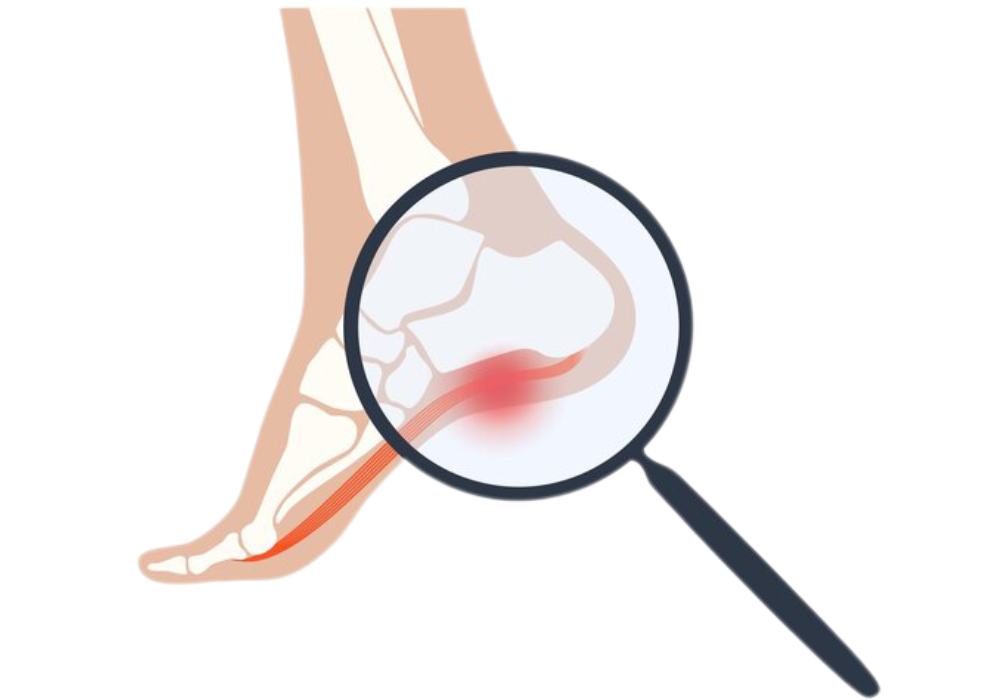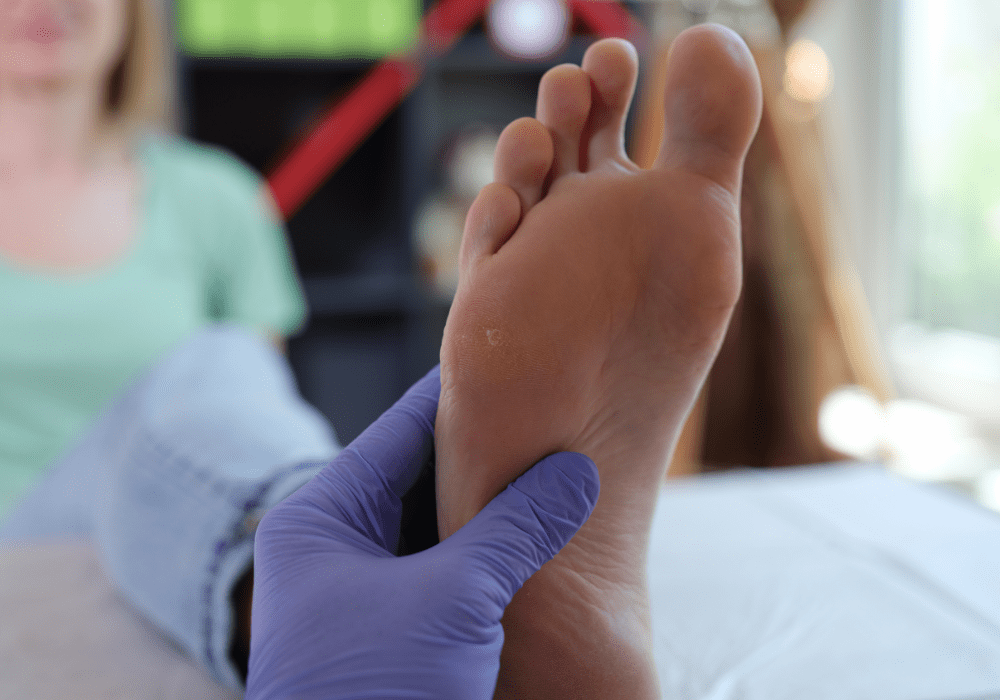Plantar fasciitis is a common condition that affects the foot, causing pain and discomfort in the heel and arch. Whether you’re an athlete, a frequent walker, or someone who spends long hours on their feet, understanding plantar fasciitis can help you manage and prevent this painful condition.

Plantar fasciitis is the inflammation of the plantar fascia, a thick band of tissue that runs across the bottom of your foot, connecting your heel bone to your toes.
Plantar fasciitis is the inflammation of the plantar fascia, a thick band of tissue that runs across the bottom of your foot, connecting your heel bone to your toes. This tissue supports the arch of your foot and absorbs shock as you walk. When the plantar fascia is overstressed or strained, it can develop tiny tears, leading to inflammation and pain.



Several factors can contribute to the development of plantar fasciitis:
Overuse :
Activities that put a lot of stress on your feet, such as running, dancing, or prolonged standing, can lead to overuse of the plantar fascia.
Foot Mechanics:
Flat feet, high arches, or abnormal walking patterns can affect how weight is distributed across your feet, increasing the strain on the plantar fascia.
Age:
Plantar fasciitis is most common in people between the ages of 40 and 60.
Obesity:
Excess weight adds extra stress to your plantar fascia
Improper Footwear:
Overuse :
Wearing shoes with poor arch support, thin soles, or those that don’t fit well can contribute to the development of plantar fasciitis.
One of the hallmark symptoms of plantar fasciitis is a sharp, stabbing pain, often described as a feeling of a knife or pin being driven into the bottom of the foot. This pain is usually most severe after waking up in the morning or after long periods of rest, such as sitting or standing for extended periods. Interestingly, the pain associated with plantar fasciitis often eases with activity. After a few minutes of walking or engaging in movement, the pain may decrease or become more bearable. However, prolonged standing, walking, or intense activity can exacerbate the pain and cause it to return. Plantar fasciitis pain is typically localised to the bottom of the foot, specifically around the heel and the arch. It is commonly felt in one foot, although it can affect both feet simultaneously in some cases.
These symptoms are often aggravated by factors such as wearing shoes with poor arch support, engaging in high-impact activities like running or jumping, having tight calf muscles or Achilles tendons, or being overweight. Over time, if not properly addressed, plantar fasciitis can lead to chronic foot pain and impact daily activities.



Surgical treatment for plantar fasciitis is considered a last resort and is only recommended when conservative treatments have been exhausted and the pain persists or worsens over an extended period.
Surgeons typically consider surgery for plantar fasciitis when the condition does not respond adequately to conservative measures such as rest, ice therapy, stretching, orthotic devices, and physical therapy. The pain may become chronic, severely limiting daily activities and quality of life.
The most common surgical procedure for plantar fasciitis is called plantar fascia release surgery. This procedure involves partially cutting or detaching the plantar fascia from the heel bone (calcaneus) to relieve tension and reduce inflammation. There are two primary techniques for plantar fascia release:
Open Plantar Fascia Release: This traditional approach involves making a larger incision in the foot to access the plantar fascia directly. Surgeons can visually assess the extent of the damage and release the fascia as needed.
Endoscopic Plantar Fascia Release: In this minimally invasive procedure, smaller incisions are made, and an endoscope (a thin, flexible tube with a camera) is used to guide the surgical instruments. This technique typically results in less scarring and a faster recovery compared to open surgery.



Following plantar fascia release surgery, patients typically require a period of rest and immobilisation to allow the foot to heal. Physical therapy is often recommended to regain strength, flexibility, and range of motion in the foot and ankle. Patients may need to wear a protective boot or brace during the initial recovery phase.
While surgical treatment can provide relief for severe cases of plantar fasciitis, it is not without risks. Potential risks and complications include infection, nerve damage, delayed healing, persistent pain, and a possibility of weakening the arch of the foot. Surgeons carefully evaluate the risks and benefits with each patient before proceeding with surgery.
Many patients experience significant improvement in pain and function after plantar fascia release surgery. However, it’s essential to follow post-operative care instructions, continue with rehabilitation exercises, and make lifestyle modifications to prevent recurrence of plantar fasciitis.
Preventing plantar fasciitis involves taking steps to reduce stress on your feet:
Choose shoes with good arch support and cushioning. Keeping your weight in check reduces the strain on your plantar fascia.Stretch your feet and legs before engaging in physical activities and gradually increase the intensity and duration of your physical activities to avoid overuse.
Understanding plantar fasciitis and its causes can help you take proactive steps to manage and prevent this painful condition. If you experience persistent heel pain, consulting a healthcare professional is crucial for a proper diagnosis and treatment plan, ensuring you can get back on your feet comfortably and quickly.
Visit Apex Sports Clinic for personalized treatment plans.
Elevate your performance with Apex Sports Clinic! Schedule an appointment today for personalized, expert care in optimizing your athletic potential.


